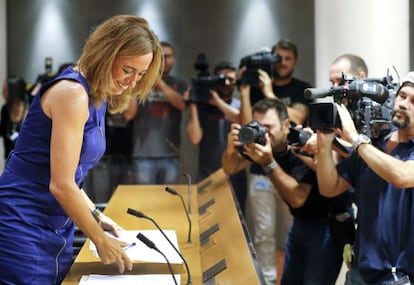Socialist leadership candidate Chacón to take arms-length sabbatical from political fray
Former defense minister to give up congressional seat to teach in US in what observers describe as a “tactical move” “I’m going with a return ticket and you’ll see me back again here next year"

Carme Chacón, defense minister in the Socialist Party (PSOE) government of Prime Minister José Luis Rodríguez Zapatero and an aspirant to lead Spain’s main opposition party, has decided to abandon her seat in Congress to teach at a US university, but insists she will continue to remain active in Spanish politics.
Announcing the reasons for what radio station SER quoted sources both close to her circle of supporters and detractors describing as a “tactical” withdrawal, Chacón told a news conference on Thursday that her decision to give classes in Comparative Public Law and Internal Politics at the University of Dade Miami in “no way” should be construed as an abandonment of her political aspirations, insisting that she would attend a Socialist conference due to held in November and would return to Spain in June.
“I’m going with a return ticket and you’ll see me back again here on June 30 and any time that needs be,” the former minister said. “I am not going to remain quiet nor cease to give my opinion.”
Chacón, who was previously a lecturer in Constitutional Law at the University of Girona in Catalonia, narrowly lost a leadership election at a Socialist convention in early 2012, shortly after the party had been crushed by the Popular Party in the November 2011 general elections. Alfredo Pérez Rubalcaba, who had run as the PSOE’s prime-ministerial candidate, prevailed over Chacón, but has since agreed that party primaries should be held to choose the leading Socialist candidate before the next general election.
I had a project based on generational renewal, valid both for socialism and for the Spanish political system"
At the news conference she gave on Thursday, Chacón made it clear that she would like to see changes within the party, which is expected to hold its primary election sometime in 2014, after elections to the European Parliament in May and possibly in the fall of that year. “I had a project based on generational renewal,” Chacón, 42, said. “That remains valid, valid both for Spanish socialism and for the Spanish political system,” she continued. "My intention is to contribute to that as soon as possible. My party has other plans and a calendar that I do not share.”
Chacón was accompanied at her news conference by a number of Socialist lawmakers in Congress. She insisted that she believes she could still get her ideas across in public without having to hold on to a seat in parliament. “The commitment goes far beyond a parliamentary seat.”
Observers pointed out that Chacón’s decision to take a sabbatical comes days after a major shift in the leadership of the Andalusian branch of the PSOE, the most powerful within a party built on a strong federal structure. Socialist José Antonio Griñán earlier this week resigned as head of the regional government in what he described as a “generational” change that paves the way for Susana Díaz, a strong supporter of Chacón in the tussle for the national leadership of the Socialists, to take over the reins.
Chacón declined to say whether she would stand as a candidate for the leadership of the Socialist in next year’s primaries. “It will be up to my colleagues to decide which number I wear on my back when the time comes,” she said.
The former defense minister has also been at odds with her own Catalan branch of the Socialist Party, which went against the wishes of the national leadership by supporting an initiative by the ruling nationalist Catalan group CiU for the right to call a referendum to vote on possible self-rule for Catalonia. Chacón abstained in a vote in Congress on that initiative.
“I will give my vision and my opinion on how Catalonia will have no future, denying a part of itself rather than within a whole and always part of Europe,” Chacón said on Thursday.
The leader of the PSC Catalan Socialist Party, Pere Navarro, said that Chacón’s decision was “entirely worthy of respect.”
From the ranks of the Popular Party (PP), Vicente Martínez-Pujalte, the ruling party’s economic spokesman, agreed that Chacón’s decision was an “appropriate” one, adding that she was still “very young.”
But the leader of the PP in Catalonia, Alicia Sánchez-Camacho, was less understanding: “I regret that someone like Carme Chacón should leave at a time when the greatest commitment is needed to guarantee the unity of Spain and amidst the deep crisis within the PSC.”
Tu suscripción se está usando en otro dispositivo
¿Quieres añadir otro usuario a tu suscripción?
Si continúas leyendo en este dispositivo, no se podrá leer en el otro.
FlechaTu suscripción se está usando en otro dispositivo y solo puedes acceder a EL PAÍS desde un dispositivo a la vez.
Si quieres compartir tu cuenta, cambia tu suscripción a la modalidad Premium, así podrás añadir otro usuario. Cada uno accederá con su propia cuenta de email, lo que os permitirá personalizar vuestra experiencia en EL PAÍS.
¿Tienes una suscripción de empresa? Accede aquí para contratar más cuentas.
En el caso de no saber quién está usando tu cuenta, te recomendamos cambiar tu contraseña aquí.
Si decides continuar compartiendo tu cuenta, este mensaje se mostrará en tu dispositivo y en el de la otra persona que está usando tu cuenta de forma indefinida, afectando a tu experiencia de lectura. Puedes consultar aquí los términos y condiciones de la suscripción digital.








































